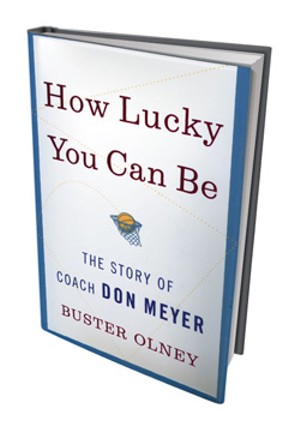Published January 19, 2011 at 11:20 a.m.
Sportswriter Buster Olney ends all his columns with the same line: “And today will be better than yesterday.” It’s a curious signature, given that Olney’s area of expertise is not self-help or motivational speaking but Major League Baseball.
His sign-off typically concludes a brief roundup of baseball news and notes from publications around the country — about an aging middle reliever clinging to a roster spot; the spring-training invitees of the perennially abysmal Pirates; the retirement of a career bench coach. These are inconsequential stories to all but the most ravenous baseball fans. But they are the kinds of stories that color inside baseball’s chalk lines. They speak to the human side of baseball, the heart of the game. They also illustrate a theme central to Olney’s writing: Great sports stories are rarely about sports.
Olney, 46, is a senior writer at ESPN: The Magazine and a regular contributor to ESPN.com, ESPN Radio and several ESPN television shows, including “SportsCenter” and “Baseball Tonight.” The Vanderbilt University grad who grew up in Randolph Center, Vt., has covered the San Diego Padres, Baltimore Orioles and New York Mets as a beat reporter. He also covered the New York Yankees for the New York Times from 1998 to 2001, and subsequently wrote a New York Times best seller about those historic teams, The Last Night of the Yankee Dynasty: The Game, the Team, and the Cost of Greatness.
Olney’s latest book, released in November 2010, is How Lucky You Can Be: The Story of Coach Don Meyer. The book centers on Meyer, a little-known college basketball coach. But it has little to do with roundball. Much as Olney’s Yankees book was less about baseball than an examination of the perils of success, Lucky is a story of personal triumph and the impact one person can make on the lives of others, even in his own most desperate hours.
“It’s about a basketball coach,” says Olney. “But it’s not really a basketball book. It’s mostly about a family dealing with a trauma.”
Olney’s first job out of college was covering minor-league baseball and city college basketball for the Nashville Banner in 1988. One of the schools he covered was Lipscomb University, where Meyer coached the men’s basketball team. Olney grew to know Meyer well over the years, and stayed in touch with the coach after leaving Nashville.
In September 2008, Meyer was nearly killed in an automobile accident after he fell asleep at the wheel leading a caravan of players on a team retreat. The crash claimed his left leg. Worse, during surgery to save his life, the operating doctor discovered Meyer had carcinoid cancer, a slow-developing but terminal form of the disease.
“When I heard about his accident … I knew right away I wanted to do the story for television,” says Olney. That piece, produced for the ESPN news-magazine program “E:60,” was nominated for an Emmy. “But I knew I’d want to write a book on him, too,” he adds.
Olney understood there was more to Meyer’s story than could be captured in a 13-minute TV segment. “I knew … the impact he had on people through the years.”
Don Meyer hardly has the name recognition of other great college coaches. Few would — or even could — cite him alongside the likes of John Wooden, Dean Smith or Mike Krzyzewski. But he is, nonetheless, admired by his peers. When Meyer retired from Northern State University at the end of the 2010 season, he left the South Dakota school as the all-time wins leader in men’s college basketball with 923 in 38 seasons — or 259 more wins than Wooden, generally acknowledged as the greatest college coach in history.
“Not a lot of people know him,” says Olney. “But I knew how good his teams were and how seriously he took basketball, and what a big name he was in basketball circles.”
As Olney’s book reveals, Meyer’s legacy is defined as much by his actions off the court as his legendary presence on it. His influence is reflected in the outpouring of support in the wake of his accident and subsequent diagnosis.
In the book’s sixth chapter — the book’s “heart and soul,” according to Olney — we meet Wade Tomlinson, one of Meyer’s former players. Tomlinson was distraught over news of the crash and didn’t know what he could do to help. It was only at the insistence of his wife, Jennifer, that he went to visit his fallen former coach in the hospital.
Meyer had already touched Tomlinson’s life off the court. In 1999, 10 years after playing for Meyer, Tomlinson lost his 18-month-old son, Riley, when he drowned in a neighbor’s swimming pool. Meyer was the first person to come to the Tomlinsons’ aid following the tragedy. The coach handled funeral arrangements and served as a de facto grief counselor for the couple.
“Both Wade and Jennifer told me they didn’t think there was any way their marriage would have survived without Coach Meyer,” says Olney.
The author describes Meyer as a “24/7 coach,” a workaholic who put basketball ahead of virtually everything.
“He was the real deal,” Olney says. “He wasn’t in it for a shoe contract or headlines or a lot of money. He was in it because he thought it was important to help try and educate kids.”
In 38 seasons, Meyer had only one player who reached eligibility but didn’t graduate.
Olney says capturing that intensely passionate commitment, and the personal consequences of Meyer’s basketball obsession, presented a unique challenge.
“[Meyer’s] wife and kids were very open about how much they sacrificed for basketball through the years,” he says. “But as a writer, part of the challenge with someone most people don’t know was how to quickly establish him as a character … that people are invested in and are learning about for the first time.”
Meyer’s compassion, force of personality and strength of character often speak for themselves. Near the end of Chapter 6, Tomlinson seeks out Meyer at a basketball camp to thank him for helping him and his wife through their tragedy. “Coach, I can’t thank you enough,” Tomlinson says.
Meyer’s response: “Wade, we all can’t thank each other enough.”
While writing Lucky, Olney had a brush with just the sort of personal crisis he was chronicling. On January 1, 2010, his younger sister, Amelia, was diagnosed with leukemia.
“It was almost as though, while I was writing about Coach Meyer, I was really writing for Amelia,” he says. He dedicated the book to his sister, who was recently pronounced cancer free following a grueling year of treatment.
Olney says he’s never had more fun covering anything than he did writing about Meyer’s teams and Lipscomb’s rivalry with Belmont University. That’s quite a statement, considering he has covered some of the era’s most significant sports stories — chief among them, Cal Ripken breaking Lou Gehrig’s record for consecutive games played and the Yankees dynasty. But Meyer’s story resonates with Olney so deeply because it’s personal.
“It was like picking up a conversation that I had started when I was covering his teams in the late ’80s,” Olney says.
“There was so much integrity to [the rivalry],” Olney continues. He explains that, more than the actual games, what made the rivalry compelling was its humanity, the personalities of the characters involved — people such as Wade Tomlinson and, of course, Don Meyer.
“I drew [inspiration] out of this process,” says Olney of his inspiration for the book. “But really, I have been drawing out of knowing Coach Meyer since I was a reporter when I was 24 years old.”
Meet Buster
Buster Olney will sign copies of "How Lucky You Can Be" at Gifford Hospital in Randolph on Saturday, January 22 at 4:30 p.m., and at Burlington Bay on Sunday, January 23 at 1:30 p.m.
More By This Author
Speaking of...
-

UVM Swimming and Diving Overcomes Budget Cuts to Win Conference for the First Time in Its History
Mar 13, 2024 -

Two Vermont Teens Take On the Cross-Country Junior National Championships
Mar 6, 2024 -

Youth Soccer Comes of Age in Vermont, but the Playing Field Is Hardly Level
Nov 1, 2023 -

In a Classic Vermont Mountain Road Rally, Winning Takes Precision and Smarts, Not Speed
Sep 20, 2023 -

True Grit: Gravel Biking in Vermont Is Gaining Traction and Building Community
Apr 26, 2023 - More »
Comments
Comments are closed.
From 2014-2020, Seven Days allowed readers to comment on all stories posted on our website. While we've appreciated the suggestions and insights, right now Seven Days is prioritizing our core mission — producing high-quality, responsible local journalism — over moderating online debates between readers.
To criticize, correct or praise our reporting, please send us a letter to the editor or send us a tip. We’ll check it out and report the results.
Online comments may return when we have better tech tools for managing them. Thanks for reading.














































